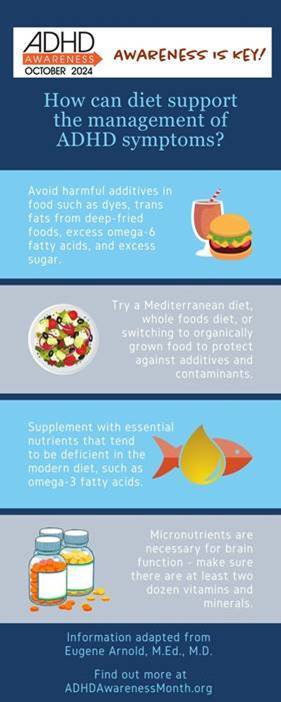Diet/nutrition can help ADHD symptoms in two ways: by avoiding harmful additives (dyes, excess sugar, trans fats, etc.), especially in highly processed foods, and by ensuring essential nutrients for brain health (vitamins, essential minerals, omega-3 fatty acids, complete protein). Two strategies for ensuring essential nutrients are healthful diets (e.g., Mediterranean or whole foods) and supplementation with micronutrients (e.g., multivitamins/minerals, fish oil).

Evidence is accumulating about the importance of diet and nutrition in supporting brain health, including in ADHD.
First, there are some things in the average highly processed Western diet that detract from brain health. These include food dyes, which have no nutritional value (solely cosmetic, making food more attractive), but have been shown to have a small significant detrimental effect on all children’s behavior. Another problem is trans fats in deep-fried chips, fries, and deep-fried meats. A related problem is an excess of omega-6 fatty acids from a large amount of vegetable oil, which metabolically competes with the omega-3 acids necessary for optimal brain function.
Excess sugar is controversial because some early studies found no effect, but that was in comparison to aspartame, which we now know is not harmless. It’s best to avoid sodas, whether sweetened with sugar or artificial sweetener.
There are also unintended contaminants, such as pesticide residues and leaching from plastic containers. Things like a Mediterranean diet or a whole foods diet or switching to organically grown food can protect against such additives/contaminants. Reading labels before buying is also important: look for things like dyes, sugar, syrup, aspartame, and chemicals with unpronounceable names.
Another nutritional strategy is supplementing with essential nutrients that tend to be deficient in the modern diet. These include omega-3 fatty acids, which is supported by a dozen placebo-controlled studies showing a small but significant benefit (make sure the label says “USP” or “refined to eliminate mercury”). Another way to get enough omega-3 is by eating oily, wild ocean fish (tuna, salmon, cod, sardines) several times a week.
Micronutrients (vitamins & minerals) are necessary for brain function. “Broad-spectrum” micronutrients, containing all 30 vitamins and essential minerals in doses above RDA/RDI, have shown benefit in three placebo-controlled studies, two in children, and one in adults. Because, on average, Americans have deficient intake of seven micronutrients, supplementation with a single one is not likely to help. Make sure the label shows at least two dozen vitamins and minerals.
About the Author

L. Eugene Arnold, M.Ed., M.D. is Professor Emeritus of Psychiatry at Ohio State University. For his work on the multi-site NIMH Multimodal Treatment Study of Children with ADHD (“the MTA”) he received the NIH Director’s Award. His publications include 10 books, >70 chapters, and >400 articles.
References
- Johnstone JM, Hatsu I, Tost G, Srikanth P, Eiterman L, Bruton A, Ast H, Robinette L, Stern M, Millington E, Gracious B, Hughes A, Leung B MY, Arnold LE. Micronutrients for Attention-Deficit/Hyperactivity Disorder in Youth: A Placebo-Controlled Randomized Clinical Trial. Journal of the American Academy of Child and Adolescent Psychiatry 2022;61(5):647–661. https://doi.org/10.1016/j.jaac.2021.07.005
- Vesco, A.T., Young, A.S., Arnold, L.E., & Fristad, M.A. (2018). Omega-3 supplementation associated with improved parent-rated executive function in youth with mood disorders: Secondary analyses of the omega 3 and therapy (OATS) trials. Journal of Child Psychology and Psychiatry, 59(6), 628 – 636. doi: 10.1111/jcpp.12830
- Julia J. Rucklidge, Chris M. Frampton, Brigette Gorman and Anna BoggisVitamin–mineral treatment of attention-deficit hyperactivity disorder in adults: double-blind randomised placebo-controlled trial. The British Journal of Psychiatry doi: 10.1192/bjp.bp.113.132126
- Arnold LE, Lofhouse NL, Hurt EA (2012). Artificial Food Colors and Attention-Deficit/Hyperactivity Symptoms: Conclusions to Dye for. Neurotherapeutics 9:599-609, 2012. DOI: 10.1007/s13311-012-0133-x
